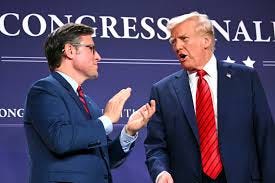House Republicans Celebrate Unity at Retreat, But Policy Battles Loom
Tensions Over Trump’s Legislative Agenda and Funding Cuts Await as Lawmakers Return to Washington
DORAL, Fla. — House Republicans gathered at Trump National Doral this week, basking in their party’s control of Washington and celebrating their early momentum under President Donald Trump and Vice President JD Vance. But while the focus of the three-day retreat was party unity, looming legislative battles threaten to test that cohesion.
The event, attended by Speaker Mike Johnson, R-La., and other top GOP leaders, largely avoided detailed discussions about Trump’s sweeping policy agenda or how to fund it. Instead, lawmakers enjoyed a relaxed atmosphere filled with casual conversations, palm trees, and poolside networking.
“We need to work together as a team,” Vance told House Republicans in a closed-door meeting, according to Rep. Don Bacon, R-Neb. “Let’s solve disagreements together.”
Difficult Decisions Ahead
Despite the optimism, Republicans face a challenging road ahead. With a razor-thin 218-215 majority—set to shrink further when Rep. Elise Stefanik, R-N.Y., assumes her role as U.S. ambassador to the United Nations—the party has little room for internal divisions.
When Congress reconvenes, the House Budget Committee will begin work on a new budget resolution to kick-start the reconciliation process, a mechanism that allows Republicans to advance major legislative priorities without Democratic support. The package is expected to include an extension of Trump’s multitrillion-dollar tax cuts, energy policy overhauls, and stricter border security measures.
"Stay tuned on the specifics," Speaker Johnson told reporters.
However, Republicans remain divided on key fiscal issues. While some lawmakers demand deep spending cuts to offset the cost of Trump’s proposals, others worry that aggressive cuts could alienate swing-district Republicans ahead of the 2026 midterms.
“There’s a long list of priorities between the House, Senate, and White House,” said Rep. Dusty Johnson, R-S.D. “Not everything will make it into the final package, and we’re now in the winnowing process.”
Adding to the challenge, Trump has made it clear he opposes cutting Medicare and Social Security, forcing lawmakers to find alternative ways to pay for the ambitious agenda.
Potential Funding Sources and Internal Divisions
One proposal gaining traction is the reinstatement of federal student loan repayments, which were frozen under President Joe Biden.
“Restarting student loan payments is one of the easiest ways to pay for this,” said Rep. Mike Flood, R-Neb. “Some of the tougher choices involve cuts to nutrition programs and Medicaid.”
Some conservatives, including Reps. Tim Burchett, R-Tenn., and Marjorie Taylor Greene, R-Ga., are exploring ways to tackle fraud in Medicaid as a cost-saving measure. Meanwhile, fiscal hawks in the House Freedom Caucus insist that spending reductions must accompany any tax cuts.
"We’re dealing with reality, not just emotions," said Rep. Ralph Norman, R-S.C. "And I’m excited about the next two weeks."
The Stakes for the GOP
Republicans acknowledge that failing to pass Trump’s legislative priorities would have major consequences for the party.
"If we don’t get this reconciliation package done—on the border, defense, and tax cuts—we fail as a Congress," warned Rep. Mike McCaul, R-Texas. "The American people gave us a trifecta. If we don’t deliver, there will be consequences."
Disagreements remain over whether the package should be passed as a single bill or split into two measures. Trump, however, has made his expectations clear.
"We’ve got to get this done," Trump told lawmakers. "Whether it’s one bill or two, I don’t care. Just get it done."
As Republicans return to Washington, their ability to navigate these internal divisions will determine whether they can capitalize on their control of government—or see their legislative dreams stall in the face of party infighting.


